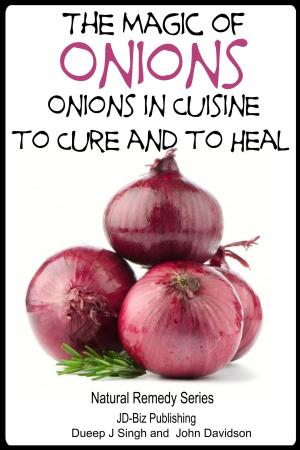The Magic of Grapes To Cure and Heal
Nonfiction, Food & Drink, Baking & Desserts, Fruit, Health & Well Being, Health, Healthy Living| Author: | Dueep Jyot Singh, John Davidson | ISBN: | 9781310563591 |
| Publisher: | JD-Biz Corp Publishing | Publication: | July 29, 2014 |
| Imprint: | Smashwords Edition | Language: | English |
| Author: | Dueep Jyot Singh, John Davidson |
| ISBN: | 9781310563591 |
| Publisher: | JD-Biz Corp Publishing |
| Publication: | July 29, 2014 |
| Imprint: | Smashwords Edition |
| Language: | English |
The Magic of Grapes To Cure and Heal
Table of Contents
Introduction
The Global Scope of Grapes
Grapes for Health
Grapes to “cure” Possible Incurable Diseases
Types of Grapes
Difference between Wine Grapes and Table Grapes
How Do You Grow Grapes?
Best Climate for Grapes
Best Soil for Grapes
Grapes from Seeds or from Young Vines?
Plenty of Water
Making a Trellis for Your Vine
Protecting Your Grapes from Birds
Harvesting Your Grape Yield
Difference between Sultanas, Raisins and Grapes.
How to Get Grape Juice?
Resveratrol
Christmas Fruitcake
Traditional Carrot Pudding
Using Grapes for Natural Cures
Constipation
Teething Problems
Stress and Strain
TB
Dry Cough
Flatulence and Digestion Related Problems
Conclusion
Introduction
The moment you hear the word “grapes”, you visualize a bunch of yellow or black – purple delicious, juicy fruit, which you enjoy plucking off their stalks and popping in your appreciated mouth. Believe it or not, grapes are just about the only fruit, which can be eaten in large quantities, without any sort of harmful side effects.
The magic about grapes is that not only is this considered to be an extremely good way which you can cure yourself, but it is also such a good and delicious, easy to eat fruit, that even fussy and finicky eaters who touch fruits and vegetables very rarely cannot resist a fistful of grapes.
The history of grapes goes back as long as mankind existed. In prehistoric times, grapes were gathered in the jungles, before man decided to cultivate them in his vineyards or gardens.
The Bible says that Noah grew grapes on his farm. But before that, the classical age of Greece had already assigned a God Dionysius, as the God of grapes and wine, and you can see him sporting around with the grape vine leaves around his head as he blesses his worshipers with the gift of the grapes – wine. The Romans called him Bacchus.
So when did wine get associated with grapes? An old legend talks about a Georgian princess who was suffering from toothache around 8000 years ago. No dentist would do anything for her, so being a delicate dainty darling, she said that she was going to kill herself because she could not bear the pain. So she went around looking for something to eat, which would put her out of her misery.
Now one of her could not care less slaves had left some grape juice neglected in an earthenware pot, and it had been fermenting over a long time in its corner. Naturally, it gave out the fermenting aroma of grape wine, which no one in that land had smelled before. So the Princess grabbed this pot, and drank everything and grew tipsy.
I am sure, she woke up with a hangover, but according to her, her toothache was gone and she had slept and dreamt pleasantly of no pain. Well, that was how people began to think about the juice of the grape in its fermented form.
In the same way, poetry, talking about the wine of Shiraz, going back more than 4000 years ago, speaks about the importance of wine in the old Oriental legends.
Wine can be made from almost any vegetable or fruit, yes, I have heard of people making wine from vegetables too, but that is rather an insult to the not so humble grape, because this berry is best suited to give you enough of juice, to make delicious sparkling wine, which can either be champagne, or can be ordinary table wine. Also, wine, if not made from farm grown grapes ripen in the sun in their vineyards, I consider to be sacrilege, and really not worth appreciating, or savoring.
Mark Twain in his hilarious book “Innocents abroad” talks about enjoying the adventure of he and his friends raiding an Italian vineyard at night, when they reach Italy. Now that should have been quite an intoxicating experience.
The Magic of Grapes To Cure and Heal
Table of Contents
Introduction
The Global Scope of Grapes
Grapes for Health
Grapes to “cure” Possible Incurable Diseases
Types of Grapes
Difference between Wine Grapes and Table Grapes
How Do You Grow Grapes?
Best Climate for Grapes
Best Soil for Grapes
Grapes from Seeds or from Young Vines?
Plenty of Water
Making a Trellis for Your Vine
Protecting Your Grapes from Birds
Harvesting Your Grape Yield
Difference between Sultanas, Raisins and Grapes.
How to Get Grape Juice?
Resveratrol
Christmas Fruitcake
Traditional Carrot Pudding
Using Grapes for Natural Cures
Constipation
Teething Problems
Stress and Strain
TB
Dry Cough
Flatulence and Digestion Related Problems
Conclusion
Introduction
The moment you hear the word “grapes”, you visualize a bunch of yellow or black – purple delicious, juicy fruit, which you enjoy plucking off their stalks and popping in your appreciated mouth. Believe it or not, grapes are just about the only fruit, which can be eaten in large quantities, without any sort of harmful side effects.
The magic about grapes is that not only is this considered to be an extremely good way which you can cure yourself, but it is also such a good and delicious, easy to eat fruit, that even fussy and finicky eaters who touch fruits and vegetables very rarely cannot resist a fistful of grapes.
The history of grapes goes back as long as mankind existed. In prehistoric times, grapes were gathered in the jungles, before man decided to cultivate them in his vineyards or gardens.
The Bible says that Noah grew grapes on his farm. But before that, the classical age of Greece had already assigned a God Dionysius, as the God of grapes and wine, and you can see him sporting around with the grape vine leaves around his head as he blesses his worshipers with the gift of the grapes – wine. The Romans called him Bacchus.
So when did wine get associated with grapes? An old legend talks about a Georgian princess who was suffering from toothache around 8000 years ago. No dentist would do anything for her, so being a delicate dainty darling, she said that she was going to kill herself because she could not bear the pain. So she went around looking for something to eat, which would put her out of her misery.
Now one of her could not care less slaves had left some grape juice neglected in an earthenware pot, and it had been fermenting over a long time in its corner. Naturally, it gave out the fermenting aroma of grape wine, which no one in that land had smelled before. So the Princess grabbed this pot, and drank everything and grew tipsy.
I am sure, she woke up with a hangover, but according to her, her toothache was gone and she had slept and dreamt pleasantly of no pain. Well, that was how people began to think about the juice of the grape in its fermented form.
In the same way, poetry, talking about the wine of Shiraz, going back more than 4000 years ago, speaks about the importance of wine in the old Oriental legends.
Wine can be made from almost any vegetable or fruit, yes, I have heard of people making wine from vegetables too, but that is rather an insult to the not so humble grape, because this berry is best suited to give you enough of juice, to make delicious sparkling wine, which can either be champagne, or can be ordinary table wine. Also, wine, if not made from farm grown grapes ripen in the sun in their vineyards, I consider to be sacrilege, and really not worth appreciating, or savoring.
Mark Twain in his hilarious book “Innocents abroad” talks about enjoying the adventure of he and his friends raiding an Italian vineyard at night, when they reach Italy. Now that should have been quite an intoxicating experience.















